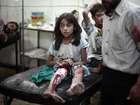Syria is facing a "medical and humanitarian disaster" after nearly four years of war have gutted the country's healthcare system, leading to a return of eradicated diseases, a group of Syrian doctors said in Paris Monday.
A lack of doctors, supplies and drugs have plunged the country back into the medical dark ages, with polio and scabies back with a vengeance as many children are no longer vaccinated, while the majority of births take place at home.
 Full Story
Full Story
People who eat more whole grains are more likely to live longer and avoid heart disease, but such a diet does not affect risk of dying from cancer, said a U.S. study released Monday.
The findings by researchers at Harvard University appear in the Journal of the American Medical Association (JAMA) Internal Medicine.
 Full Story
Full Story
People who are obese may appear healthy for a while but their condition declines over time, said a study out Monday that followed more than 2,500 people for 20 years.
The research by scientists at University College London is the longest of its kind, and its findings support previous research that has shown people who are overweight face a higher risk of heart attack, stroke and some kinds of cancer than thin people as the years go on.
 Full Story
Full Story
Schools in Ebola-ravaged Liberia will reopen in February, six months after they were closed in a bid to contain the spread of the killer virus, the education ministry said Monday.
"We ask all schools to take the necessary measures for the reopening of schools next semester, which is February," the ministry said in a statement read out on the radio.
 Full Story
Full Story
Older men with prostate cancer may live longer if they receive a combination of radiation and hormone therapy, but many men do not get the right treatment, U.S. researchers said Monday.
The dual therapy saved nearly 50 percent more lives among men aged 76 to 85 with locally advanced prostate cancer, compared to those who received hormone therapy alone, said the findings in the Journal of Clinical Oncology.
 Full Story
Full Story
Travelers coming to the United States from Mali will no longer be required to undergo extra screening at selected airports for potential exposure to Ebola, U.S. authorities said Monday.
On Tuesday, the West African nation will mark 42 days -- or two full incubation cycles -- since the last Ebola patient in Mali had contact with anyone who was not wearing protective gear, the Centers for Disease Control and Prevention said.
 Full Story
Full Story
"The condition of Pauline Cafferkey has gradually deteriorated over the past …
A British nurse with Ebola was fighting for her life Sunday as two health workers, who also spent time in Sierra Leone, were placed under observation in the U.S. and Germany.
 Full Story
Full Story
The Ebola lockdown in the northern Tonkolili district of Sierra Leone was extended on Sunday for two weeks as authorities stepped up the fight to contain the epidemic.
The move comes as the government imposed "additional screening measures" at Freetown International Airport after two workers apparently caught the disease.
 Full Story
Full Story
China has abolished price controls on tobacco leaf, the last agricultural product to have limits, the country's top economic planner said as authorities seek to give the market a greater economic role.
But tobacco leaf prices are only a small factor in the cost of cigarettes -- a state monopoly in China -- so the move is unlikely to have a significant effect on smokers.
 Full Story
Full Story
Children who have access to tablets or smartphones in their bedrooms get less sleep than children who do not have the devices with them at night, a U.S. study said Monday.
The findings in the January 5 edition of the journal Pediatrics show that having a so-called "small screen" within reach was slightly worse than a television set when it came to sleep deprivation in a group of 2,000 middle school kids.
 Full Story
Full Story



